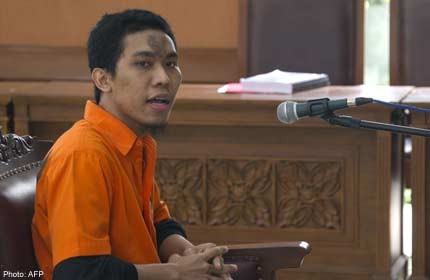Myanmar embassy bomb plot: Trial begins in Jakarta

THE first of five men charged in connection with a plot to bomb the Myanmar embassy has gone on trial, in a case that highlights how the plight of the Rohingyas has become a rallying point for militants here.
The South Jakarta District Court heard yesterday how Separiano, 29, contacted fellow suspect and ringleader, Sigit Indrajid, 23, on Facebook and agreed to his plan to launch an attack using five homemade bombs after Friday prayers on May 3.
Upon learning that a radical group was holding a mass demonstration on the same day targeting the embassy over the same issue, he agreed to move up the time of their attack to just before the demonstrations would begin.
The case not only shed light on how increasingly younger Indonesians are becoming aspiring terrorists by actively recruiting and networking over social media sites. It also points to how the persecution of ethnic-minority Muslim Rohingyas - widely covered here - has resonated with radicals in Indonesia, the world's most populous Muslim-majority country.
In April this year, Separiano chatted with Sigit, identified as a potential suicide bomber by anti- terror police, after reading his many posts about the Rohingyas in Myanmar which attracted a lot of comments calling on people to take revenge against the "infidel Buddhists", the court heard.
By this time, he had already been radicalised by sermons he heard from jailed firebrand cleric Abu Bakar Bashir, spiritual leader of the Jemaah Islamiah, and had been studying bomb-making methods online.
Weeks later on April 27, he and others met at Sigit's rented house to discuss plans to avenge the Rohingyas' suffering, the court heard.
"Let's launch a holy attack on the Myanmar embassy to counter the brutality of the Burmese that have beaten up Muslims in Myanmar," state prosecutor Susilo said, reading out Sigit's testimony. "We will launch it when FUI (Forum Umat Islam, a coalition of Islamic hardline groups) hold their mass demonstrations. But we detonate the bombs first before they start their demonstrations, as a surprise to the Myanmar embassy." Separiano had allegedly replied: "Yes, ok."
Initially, the plan was to meet at the iconic Hotel Indonesia traffic circle where Separiano would hand over the pipe bombs he made to Sigit to attach a watch to them as a timing device.
Separiano made the bombs two days before the planned attack, using sulphur and ethanol, among other chemicals.
Police foiled their plans when they nabbed Separiano and Achmad Taufiq, 21, on a motorcycle after a high-speed chase along a central Jakarta road. Both had backpacks filled with bombs and cables. Sigit went on the run, but was caught in May in a wave of arrests that also netted two others linked to the plot.
Separiano has been charged with plotting an act of terrorism or assisting in the planning of such an act; and plotting to commit a terrorist act that could result in injuries or deaths or damage to buildings.
While the threat of a large-scale terror attack in Indonesia remains low as home-grown terrorists are fragmented and operate in loose networks, they are constantly recruiting and plotting, analysts say.
Their targets have shifted from Western to local ones like the police, but international issues such as the conflicts in Middle East and sectarian violence in Buddhist-majority Myanmar can be rallying points.
zubaidah@sph.com.sg

Get a copy of The Straits Times or go to straitstimes.com for more stories.